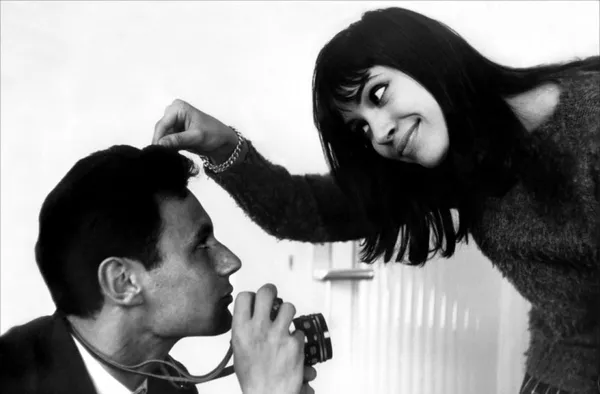Eye For Film >> Movies >> The Little Soldier (1963) Film Review
The Little Soldier
Reviewed by: Chris

Big wars often come with big ideals. Freedom. Independence. The rights of men and women in every country. But sometimes it’s the smaller wars that test national morality. Fighting for freedom makes us feel noble. But what of noble men in a war less clear? When nobility cries out against unjust means to equivocal ends? For what is that sacrifice made? Where are ideals if we kill innocent people? Betray them? Torture them?
Godard makes torture his theme and how an allied government will seek to ‘justify’ it, or deny it when they practice it. Murder of innocents by an enemy is ‘horrific’: whereas murder of innocents by an ally is ‘necessity.’

Banned for three years when made (until the censoring French ruling party was overthrown), Le Petit Soldat is as relevant today as it was in 1963. It is impossible to watch without thinking of Guantanamo, of extraordinary rendition and (explicitly) waterboarding.
Bruno Forestier is a photo-journalist at the time of the Algerian war, a war of independence against France, and working undercover for the French Information Bureau. He is in Geneva, the ‘neutral place where agents from different countries meet to plot war.’ But to view the Petit Soldat only as political, misses its richness. It is simultaneously political parody, film noir, thriller, quirky romance, and a live documentary on the director’s developing love affair with his leading actress, Anna Karina (who would later become his muse). For myself, watching Godard, I am swept away by his techniques, intrigued by his dialogue with the viewer, and charmed by his web of intertextual references that augment and enhance the experience long after the film has finished.
Our movie opens in murky grey tones, as if in disdain for mere high production values. A car stops at a checkpoint. (This short scene was shot repeatedly over a week as Godard worked up to filming Karina.) Dull tones move seamlessly into classic film noir style: long rolls of very fast Agfa stock permitting the shooting of long takes in low light. Although Petit Soldat is less showy in technique than Breathless, the visual flow is mesmerising. Utilising the tall buildings and beautiful bridges of Geneva, Godard allows the hand held camera (a new device at that time) to wander naturally over rooftops and things one might glance at while chatting in a car. The effect gives an authentic feel for an audience jaded by standard shot-reverse dialogue shots or artificial point-of-view shots.Quickly, we establish a hard-hitting emotional empathy with clean-cut characters as the multi-layered plot gathers pace.
Godard by this time is already in love with Karina. With most of the sound being dubbed in afterwards, he is able to put words spontaneously into the mouth of Bruno and so get Karina/Veronica’s unscripted reaction (another innovation in screenplay development and directing).
Bruno’s friend tells him of a new model he will want to photograph, betting him $50 that he will fall in love with her within five minutes. Bruno acts coldly towards Veronica, but afterwards calls his friend back, silently giving him ‘the $50 he owes.’ He says she is ‘straight out of a play by Jean Giradoux.’ This is a pun on his own name, as ‘Forestier’ is from Girardoux’s novel, Siegfried Et Le Limousin, and adds depth to the film with its cognate themes and philosophical asides. ‘Forestier’ is also the protagonist of a book by Cocteau (whose other novel is being read by one of two death-squad bosses when Bruno is later squeezed between them in the back seat of a car). Cocteau’s Forestier expands Bruno’s poetic, emotional side, but also portrays him as a man caught between the political left and right. As Bruno gradually finds his allegiances don’t come up to his romantically noble ideals, he is squeezed, metaphorically, and then brutally tortured.
Veronica Dreyer, Karina’s character, is a reference to the great filmmaker and Karina’s fellow Dane, Carl Dreyer, who was famed for‘revealing the soul’ in the carefully photographed face. Godard picks this up through Bruno’s monologue as she stares in the mirror. Using dialogue and images in the film, Godard compares not appearance with reality but appearance to others with appearance to oneself, building towards the famous and frequently misconstrued phrase, “Photography is truth, and the cinema is truth twenty-four times a second." (Le cinema c'est 24 fois la verite par seconde). It contains a paradox, suggesting that staged, fictional images of cinema and the documentary images of news photographers can equally reveal reality. In one scene, a handgun is pointed for several moments in a busy street. The (actual) passers-by, unaware that a film is being made, are not shocked by this seemingly unbelievable event. Godard demonstrates it is not only believable in cinema but believable as reality.
Bruno wants to defend ideas, not territories. Veronica, on the other hand, rails that: “… against the Germans, the French had an ideal. Against the Algerians, they don’t have one. They’ll lose the war.” Bruno makes her dance to Haydn, and decides her eyes are the grey of Velasquez rather than the grey of Renoir (a comment on how these painters portray a person through the face). He approves of Lenin’s phrase, “Ethics are the aesthetics of the future.” But Bruno’s future becomes increasingly desperate. Are ethics, we wonder, a luxury for the side that is winning?
The film is harrowing at times to watch, and Godard, even in this, his second feature, is sacrificing entertainment to art. It has none of the seductive lure of Lady From Shanghai (to which the plot pays tribute) but is visceral and riveting; and the chronological narrative makes it more accessible than much of his subsequent work.
Godard described it as a film where, “one has to yield up what one has in the guts, so to speak; and what one has in the guts is not necessarily made to be yielded up just like that.”
Reviewed on: 25 Dec 2013


















